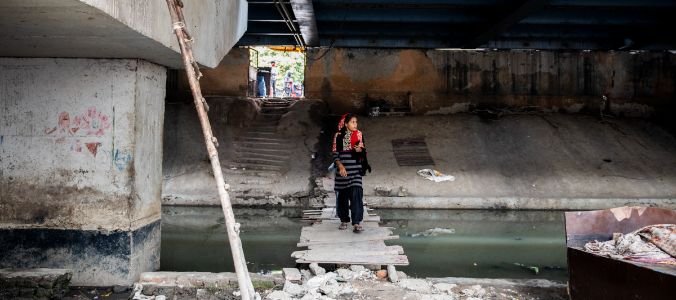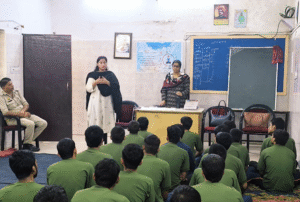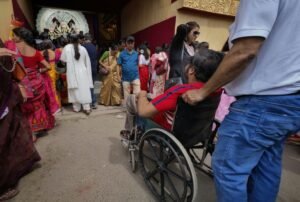
Imagine living in a basti with poor conditions, and in perpetual state of uncertainty. There is an unabating demand to beautify the city, roads need to be widened and the environment is to be protected. Adding to this pressure is the pervasive belief that residents of bastis are merely “encroachers,” obstacles to urban development. This label is laden with stigma, ignoring the complexities of these residents’ lives, their legal rights, and most importantly, their humanity.
The notion of “encroachment” has long been viewed negatively, drawing from the idea that informal settlements are illegal and people living in them deserve displacement to make way for infrastructure. The term itself dehumanises those who, by necessity, make these bastis their home. In many cases, people are pushed to the margins of society due to systemic issues such as poverty, lack of affordable housing, and rapid urbanisation. Yet, they are often demonised, and portrayed as the cause of urban problems.
As a social worker who often frequents these informal settlements, I have learnt that it is impossible to view all bastis through a single lens. Every settlement tells a different story, and behind every so-called “encroachment” is a human narrative. Despite living under the constant threat of eviction and harassment, people living in bastis have legal rights. Too often, however, these rights don’t translate into actual practice.
In my work, I am often reminded of Maslow’s hierarchy of needs, which emphasises shelter as a fundamental human need. Every day, I engage with people who are deprived of this right. In India, the right to property is a legal one, not a fundamental right. This means that arbitrary evictions and demolitions can be carried out with relative ease. For the families living in these precarious situations, a house is not just a roof over their heads—it is a sense of stability, an identity, and a feeling of community. Living in precarious conditions means paying a cost in terms of psychological turmoil and inhibition of human development.
Take, for instance, the case of Sunder Nursery basti, located in an upmarket area in south Delhi. In 2021, the settlement was demolished with only three days’ notice. The authorities justified their action citing the Graded Response Action Plan (GRAP), which was implemented due to high pollution levels in the city. On my first visit just before the demolition was carried out, I walked through cramped lanes interspersed with crumbling monuments. There was chaos. For the residents, the demolition notice meant the end of the world. Despite the Delhi High Court’s stay order on the demolition, the authorities proceeded to raze down the shanties.
In the aftermath of the demolition, I went to the basti again, to assist the residents in their legal battle to reclaim their right to housing. I was acting as a liaison between the displaced community and their lawyers. What stood out for me was the resilience of the community. Residents pooled their resources, ate meals together, and strategised their next steps. There was a palpable sense of solidarity.
What many people fail to understand is that bastis are often home to people who contribute significantly to the urban economy, working as domestic help, construction workers, or small business owners. Their presence is vital to the functioning of the city, yet they remain invisible, and their contributions are overlooked.
The story of Pratap Camp, another basti in south Delhi, illustrates the hardships that come with living in informal settlements. This basti has been around since the 1980s, and like many others, it too suffers from inadequate infrastructure. Open drains snake through the narrow lanes, and a handful of public toilets are expected to serve the entire population. In 2011, the Delhi Urban Shelter Improvement Board (DUSIB) conducted a survey and deemed 350 out of 500 families eligible for rehabilitation. In 2013, these families were asked to pay between Rs 68,000 to Rs 81,000 for their relocation, with the promise of a permanent home. Many families scraped together the money and made the payment. Yet, over a decade later, they are still waiting for their promised homes.
Despite meeting all the formal requirements, and having used up all their financial resources, residents remain trapped in conditions that are unsafe and unsanitary. They live in a state of limbo, unsure of when, or if, they will ever be relocated. Many houses run the risk of flooding during each monsoon, while summers and winters are unbearable due to a lack of proper insulation. The uncertainty has left many feeling hopeless.
Yet, the community has continued to fight. Over the past decade, the families have evolved a leadership structure, with a community leader and a team coordinating efforts to secure their promised housing.
Ironically, while I was going through the documents of the basti residents , I found that almost everyone possessed voter ID cards. As elections approach, candidates promise them housing and improved living conditions, only to abandon these promises once in power. For many, political change appears to be their only recourse, as judicial mechanisms remain largely inaccessible due to their socio-economic circumstances.
Despite these challenges, the communities in these bastis hold on to hope for a better life.
Should they not have a right to live with dignity?
Ultimately, the question we must ask ourselves is whether displacement and demolition are the only solutions to the challenges of urban development. While the concerns of the city require immediate attention, is dispossessing people of their houses the only solution we have?
It is high time we reconsider our approach to informal settlements. These communities deserve respect not just because they are a vital part of the social and economic fabric of our cities, but because they are also citizens of these cities. It is crucial for those in positions of privilege to understand their perspective, and for lawmakers to be mindful of their needs.












